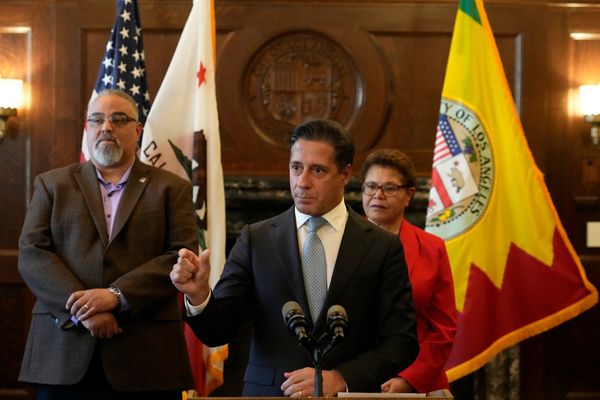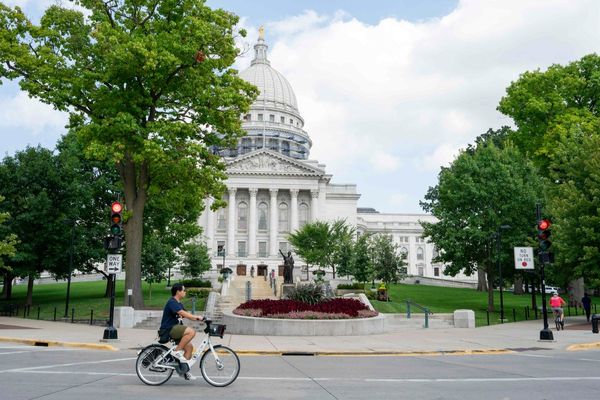CHICAGO — The first debate of Chicago’s mayoral runoff election featured a series of attacks from Brandon Johnson on Paul Vallas, who largely avoided attacking in kind, even as the criticism escalated.
Over the course of an hour, Johnson repeatedly accused Vallas of wanting to raise property taxes, enacting policies in the 1990s that cause lasting harm to the city and school district’s financial position, and working with Republicans to damage the pension system. Johnson also said Vallas doesn’t want to teach Black history and claimed he does not support women’s abortion rights.
“We’re in this predicament because of the bad accounting measures of Mr. Vallas,” Johnson said, referring to the city’s financial woes.
During the debate, Johnson also attempted to tamp down concerns that he is too close with the powerful Chicago Teachers Union, which endorsed and has funded him, but he declined to name an issue on which he disagreed with the organization.
“I have a fiduciary responsibility to the people of the city of Chicago, and once I’m mayor of the city of Chicago, I will no longer be a member of the Chicago Teachers Union,” Johnson said.
Vallas, who served as city budget chief and Chicago Public Schools CEO under then-Mayor Richard M. Daley, mostly touted his plan to hire police officers, defended the financial position he left CPS in and said he has consistently supported women’s reproductive rights.
In his only direct criticism of Johnson, Vallas attacked Johnson and the CTU for shutting down schools during the pandemic.
“A 100-year pandemic was responsible for everything being shut down,” Johnson rebutted.
Wednesday’s debate between Vallas and Johnson, moderated by NBC-5 reporter Mary Ann Ahern, was the first encounter between the two candidates since last week’s election, when they earned spots in the April 4 runoff and ended Mayor Lori Lightfoot’s bid for a second term. The more conservative Vallas and the progressive Johnson sparred throughout the divisive campaign, which saw the two typically on opposite ends of the biggest issues in the race: education and crime.
Vallas tried to cement his front-runner status by staying above the fray and not engaging Johnson directly.
Johnson also sought to pin blame for CPS teachers’ pensions funding levels on Vallas’ tenure as the schools chief and repeated his attack that Vallas would raise property taxes.
But Vallas denied he took a pension holiday, saying that decision rested with state lawmakers and that his oversight resulted in more investments in the classrooms.
Though Vallas touts that he left a surplus on CPS’ books during his time as CEO, he also oversaw changes to shift away annual payments to the Chicago Teachers’ Pension Fund in what critics say hurt the system’s long-term solvency.
That decision entailed diverting some property tax revenue from going directly into teacher pension funds and instead toward other school expenses. It came after the Republican-led Legislature and GOP Gov. Jim Edgar in 1995 overhauled how CPS was organized and gave Daley more control.
Now the teacher pension fund is estimated to hover at under 50%, though Vallas has defended himself by pointing out the system carried a 104% funding level during his time as CEO.
Meanwhile, Johnson went on the defense over his plan for a $4-per-employee head tax at large companies that perform 50% or more of their work in Chicago.
“It’s a living document,” Johnson said. “We can raise up to $20 million with that particular tax. If people do not like that particular tax, then help me find $20 million.”
“We can’t just simply say no,” he added. “I come from a large family. We were told no all the time. That’s just the word we heard before we asked again. If we’re going to get a better, stronger, safer Chicago, we have to do what safe American cities do, and they invest in people.”
Another issue Johnson targeted Vallas for was his previous negative comments on critical race theory and African American history, which Vallas has rebutted by saying Johnson doesn’t have a “record” to stand on.
Johnson claimed Vallas wants to “eliminate” such history, which would lead to students not knowing “the first Black mayor of the city of Chicago was Harold Washington, was Eugene Sawyer, right?”
Vallas did not fight back. Instead, he spoke about low math and reading proficiency rates among Chicago’s Black children. “The bottom line is there’s been a significant degrading of instruction.”
Johnson and Vallas also faced questions about politically controversial statements they’ve made. Asked about his 2009 declaration that he’s “more of a Republican than a Democrat,” Vallas reiterated that he is a “lifelong Democrat,” citing his work for Dawn Clark Netsch, his candidacy in the Democratic primary against Rod Blagojevich, and as Democratic Gov. Pat Quinn’s running mate in his failed 2014 reelection bid.
Johnson also brought up Vallas’ previous comments on abortion. “Paul Vallas is on record saying that he fundamentally opposes women’s reproductive rights. He said he fundamentally opposes abortion. But it shouldn’t be a surprise,” because of his associations with “right wing extremists who have attacked women.” Johnson added, “I’m going to protect a woman’s right to choose.”
The abortion comments were from a late 2009 interview in which Vallas, who was working to rebuild New Orleans schools, expressed conflicting views on abortion and said he would “probably register as a Republican in the next primary.”
The interviewer asked if Vallas is “a pro-choice kind of guy.” Vallas, throughout the exchange, said both that “I’m personally pro-choice,” but also, “The bottom line is, fundamentally, I oppose abortion and I oppose partial birth abortion.”
On Wednesday, Vallas again compared his stance on abortion to President Joe Biden’s, which is generally supportive of abortion rights but personally opposed to the procedure.
“I’m Greek Orthodox,” Vallas said. “I have the same position that Nancy Pelosi has or Biden has: My fundamental religious beliefs aside, I will always be 100% supportive of a woman’s reproductive rights.”
Vallas was also asked to address how his better-funded campaign coffers largely rely on wealthy donors.
Vallas has received hundreds of thousands of dollars from employees at Citadel, a firm run by Republican megadonor Ken Griffin. Griffin was asked about Citadel employees’ financial support of Vallas in a recent Bloomberg News interview. “I hope that Paul Vallas becomes the mayor of Chicago,” Griffin said. “I think he’s the best choice for the city.”
Vallas responded by saying those business interests simply want a safer city and to stem the exodus of middle-class Black families.
“At the end of the day, they know the city’s in crisis and they need someone who can manage the city and can pull together a leadership team that can run every department, every agency — whether it’s public safety, whether it’s schools, for that matter, whether it’s the budget, so that the city is addressing all the critical needs of its citizens,” he said. “And let me point out that many of these funders have backed Democratic mayors in the past.”
A pointed criticism that Vallas ignored was Johnson insinuating that Vallas’ 2009 comments about toying with running as a Republican was in backlash to Barack Obama’s election to the White House.
“Look, I know Paul is uncomfortable with this, but after Barack Obama became the first Black president of the United States of America, he (Vallas) switched parties and became a Republican,” Johnson said. “That’s just the truth of the matter.”
Vallas — who has previously denied ever switching parties — instead asked the anchor to repeat her question on transparency in city contracts by promising to release all related documents in an open manner.
But after being asked a question on how race plays into his strategy to attract enough support to the mayor’s office, Vallas did say: “Brandon obviously wants to make race the issue. I’m running for mayor of all of Chicago.”
Johnson retorted that, in fact, “Paul Vallas has made it about race.”
“The young people in the city of Chicago deserve Black history,” Johnson said. “He’s the one that said that that should not happen.”
That, Vallas responded, was “just nonsense again,” before touting that he integrated Black history into CPS’ curriculum, including adding African studies into world history and working with Local School Councils who wanted their classrooms to teach “Afrocentric curriculum.”
“My record is for everyone to see,” Vallas said.
Johnson, meanwhile, deflected a question about him declaring it’s a “political goal” to defund police by saying he would hire 200 detectives to solve crime.
“My public safety plan does just that,” Johnson said in response to the anchor asking him to react to residents who want more officers in their neighborhood. However, he did not address how promoting rank-and-file officers to detectives would then deplete beat cops. Instead, he noted that police are asked to do too many tasks that do not address immediate dangers, such as mental health crises: “You don’t ask people to do their job and someone else’s.”
Vallas repeatedly said he would bring retired officers back.
Candidates were asked whether they would continue Lightfoot’s signature Invest South/West program. Both said yes.
Vallas said he would fund continued investments by using tax increment financing revenue, borrowing money, and legalizing and taxing video poker, which is currently barred in the city. Vallas also said he would use a “fair share of casino money.” Gaming revenues from the casino, however, are bound by state law to be used for police and fire pensions.
Johnson said he would “continue and expand” the program, including by gathering more community input on projects and offering loans and microgrants “to give a jump-start” to small businesses. Lightfoot’s administration has faced criticism from some community organizers about a lack of transparency about their selection process for investments.
The forum did end on a lighter note as the two candidates were asked how they were similar.
“Well, clearly, I’m feeling a little way about the fact that we have a similar style in terms of our dress code,” Johnson said, while gesturing to their suits. He then praised Vallas’ work ethic. “Now, we obviously don’t agree once we get to work, but Paul shows up.”
Vallas, meanwhile, said the two both “live in an arena of ideas ... and I think we’ve learned things from each other.”
———







